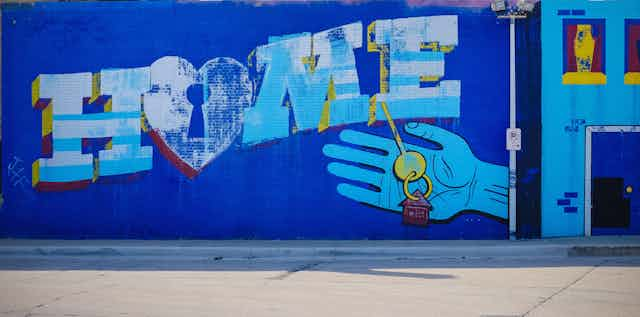More than 700,000 people have made the dangerous journey to Europe by sea so far this year. According to the UN, more than half of them were fleeing war-torn Syria. The debate rages on about big-picture questions, such as where refugees should be settled, and how countries should receive them.
But as Europe gradually negotiates a solution refugees will face a whole new set of challenges. Among unfamiliar languages, cultures, cuisines, jobs and neighbourhoods, they will be trying to establish a sense of home. But today’s refugees are by no means the first to grapple with questions about what a home is, and whether it can be found at a particular place, within human relationships, among significant objects or through cultural practices.
While the current crisis has specific and complex causes, insights can still be gained from the human stories of other migrants and refugees, who made the journey before them. In particular, my research investigates how Vietnamese migrants and refugees have re-created a home in East London.

Around 40 years ago, over a million people fled conflict and oppression in Vietnam, many of them in small, unsafe boats. The first wave of refugees was triggered by the fall of American-backed governments in Vietnam, Laos and Cambodia in 1975 and a second exodus took place when war broke out on the border between Vietnam and China. Many ended up in refugee camps in Hong Kong. This was the experience of Tuyen, who left Vietnam at the age of 11 with his mother, grandparents and two siblings. The family were eventually rescued, and after spending six months in Hong Kong, they were re-settled in Britain.
Tuyen has a vivid memory of the boat journey from Vietnam:
It was horrendous. We had to throw food overboard because there were just so many people in the boat. We kept sweet water on board and that’s how we survived, just rice and sweet water. It took us a week, drifting at sea.
Arrival in Britain
Following a 1979 UN Conference convened to address the crisis, hundreds of thousands of refugees were accepted for resettlement by nations around the world. But it was only when conflict between Vietnam and China escalated, that Britain agreed to accept refugees from Hong Kong, which was under British jurisdiction. Around 22,000 Vietnamese people were offered resettlement in the UK between 1975 and 1988.
Once in Britain, refugees faced further challenges: finding work and housing, language barriers and cultural dislocation. For many, London’s clothing factories offered the most readily available livelihood. As Britain’s clothing industry declined people found new ways to make a living, taking an entrepreneurial approach by opening restaurants and nail salons.

When asked what helps them to feel at home in London, several people emphasised the importance of Vietnamese food, and objects from Vietnam. Vietnamese food is much more widely available today than when the refugees first arrived in the 1970’s. Back then, people had to visit Paris if they wanted to buy Vietnamese ingredients. Paris already had a large Vietnamese diaspora connected to its period of French colonial rule (1858-1954).
Aesthetics were also important: several people who I visited had Vietnamese pictures, ornaments and items of furniture in their homes, including paintings of traditional countryside scenes. Some people even asked their families to send them curtains and rugs from Vietnam, which are not only cheaper than those available in London, but are seen as aesthetically preferable.
Spiritual home
For many people, spiritual practices are crucial to creating a sense of home. Many Vietnamese people offer prayers, food and material items to their ancestors, who are regarded as existing alongside living relatives. Several participants have an altar or shrine in their homes in London, usually consisting of pictures of the ancestors, offerings of fruit, flowers, and incense, candles or electric lights.

The spatial and economic constraints of London housing also influence people’s practices of worship. Several people spoke about not having enough space in their home to have a traditional altar, or not having time to maintain it properly. Yet most people found ways to worship in their new environment, adapting their practices to the local conditions. Other people visit local temples instead of worshipping at home.
Spiritual practices are also connected to work and business. Ty, who works in a Vietnamese restaurant, told me how he lights incense and makes offerings to the god of Fortune on the altar in his workplace. Altars are commonly found within Vietnamese restaurants, shops and nail salons in London.
Feeling the strain
There are parallels to be drawn between the experiences of Vietnamese refugees and the current migration crisis, despite the fact that they emerged at different times, from different countries. As is the case today, the UK government was initially reluctant to accept Vietnamese refugees, and only did so after coming under international pressure.
But the ability to make a home is also intertwined with political power and access to mobility. Today, migrants hoping to settle in the UK face an uncertain future. Their temporary status means that they have little choice but to take jobs for which they are over-qualified and under-paid, while living in transient housing conditions.
Refugees have been affected by increasingly tough border security policies and hostility from the state and the media, reflected by dehumanising rhetoric describing incoming refugees as a “swarm” and an “invasion”.
Even those who arrived years ago are feeling the strain of these changes: several of the younger participants in my study described their anxieties about feeling unwelcome and excluded, and many are returning to Vietnam.
Once they were able to establish communities, Vietnamese refugees contributed to the economy and culture of London, and the UK as a whole. Modern-day refugees could do the same, if only we give them the opportunities and support they need to build a home.
Read more on urban migration: the impact of the British diaspora and the mass migration from rural to city.

